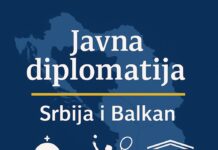César Miguel Rondón in his radio show on “Circuito Éxitos”. Screenshot of the video shared by the radio station.
Writer and journalist César Miguel Rondón was prevented from leaving Venezuela, after authorities confiscated his and his family’s passports at Maiquetía’s International Airport Simón Bolívar and declared them invalid.
Venezuelan authorities said the passports had been reported as ‘stolen‘ to the government department Administrative Service of Identification, Migration and Foreigners. According to the news site Runrun.es this is not the first time Venezuela’s government has used this strategy “as a way to prohibit leaving the country”.
Days before Rondón was prevented from leaving the country, President Nicolás Maduro threatened Rondón with prison on Twitter for his comments on escrache, a protest tactic recently adopted by Venezuelans in which demonstrators confront and publicly shame government officials and their children living outside Venezuela. The confrontations are often marked with loud banging pots, which is another protest tactic called cacerolazo.
The tweet from Rondón that generated a threat from President Maduro said: “How does it feel to be spat on worldwide? To have no place to hide, plane to fly in, to never be in peace?”
The following video shows Maripili Hernández, a former Venezuelan minister, being escorted by police to safety after she was confronted by protestors at a restaurant in Madrid:
Under Maduro, Venezuela has been struggling with a massive economic crisis, food and medicine shortages, record levels of violent crime and poverty, and relentless power cuts for three years. Maduro’s government has suppressed protests, censored the press and curtailed free expression during this time. Opponents, critics and journalists whose reporting puts the government in a negative light face imprisonment. Some have gone into self-imposed exile. Others have simply gone silent.
Rondón’s Twitter feed was changed to ‘protected mode’, but the tweets that generated the president’s comments were reproduced as screenshots alongside screenshots of his apology tweets, and reframed by government supporters who accused Rondón of being a “fascist” and a hypocrite:
Un recorrido por el TL de César Miguel Rondón o cuando te sacan de la borrachera facha pic.twitter.com/h4ootrGOdj
— Larissa Costas (@Larissacostas) May 17, 2017
Larissa Costas’ tweet: A tour around César Miguel Rondón’s Twitter’s Timeline after he’s over his fascist trip.
Later on national TV, the President said Rondón’s comments were an “incitation to violence and hate”:
Lo que César Miguel Rondón así como Tulio Hernández han promovido a través de sus cuentas de Twitter es para que estuvieran presos […] Ya deberían estar acusados judicialmente, porque están promoviendo una nueva Ruanda [en referencia al genocidio], de persecución, de matanza, de odio… y eso está penado en las leyes de Venezuela.
What César Miguel Rondón y Tulio Hernández are promoting on Twitter is [reason enough] to take them to jail. They should already be accused by the law. They’re promoting a new Rwanda [in reference to the genocide] of persecution, massacre, hate… And that’s punishable by Venezuelan law.
Rondón responded on Twitter, saying he didn’t mean to promote any words of hate and underlined how throughout his career, his words were never used to promote hate. Online media outlets reported on his response, in which Rondón apologized if his words had been misinterpreted, and maintained that he condemned the public shaming protests. As quoted by Runrun.es:
El periodista le replicó vía Twitter: “Tengo una trayectoria pública de 4 décadas. Jamás he pronunciado una palabra alentando odio o violencia entre venezolanos. Como demócrata he respetado las posiciones de los demás, aunque no las comparta. Con la palabra, jamás con la violencia”.
The journalist responded on Twitter: I have a public, 4 decade-old career. I’ve never uttered one word encouraging hate or violence among Venezuelans. As a democrat, I’ve respected everyone else’s position, even if I don’t share them. With words, never with violence.
Today, while editing this story, the passport of an opposition leader and former presidential hopeful Henrique Capriles Radonski was also suddenly declared “invalid” as he was on his way to speak at the UN about human rights abuses in Venezuela.
#18Mayo Fui retenido y anularon y robaron mi pasaporte vigente hasta 2020 en Maiquetía! Todo… https://t.co/vrosIgv8TF
— Henrique Capriles R. (@hcapriles) May 18, 2017
I was retained and they invalidated my passport in the airport, which was valid until 2010
Also read our special coverage What Is Happening in Venezuela?














